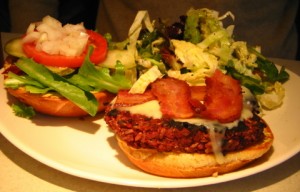Emily is incredibly fortunate to occasionally contribute her stories and thoughts to the Lift Blog maintained by some management and leadership experts she deeply admires, Bob and Ryan Quinn from the University of Michigan and the University of Virginia, respectively. This father/son pair wrote a book entitled “Lift: Becoming a Positive Force in Any Situation” that inspires the blog. This week, Ryan posted a blog that started to analyze an experience Emily had while trying to progress efforts for large scale environmental education and engagement. Ryan takes a first pass at understanding whether or not it matters if people believe in climate change… in this conversation and analysis- maybe it doesn’t.
Tag Archive: emily
The only reason why the story starts here is because I, Emily, am authoring it. I am pretty sure Tad was cooking up plenty of Small Infinity stories long before we met. And, as you’ll see as you follow this blog, plenty more stories are unfolding in the wake of what Tad started here.
The famous Cyndy Cleveland from the Erb Institute for Global Sustainable Enterprise made the suggestion I meet Tad (connecting people is certainly a small infinity strength of hers!). I was a prospective student and Tad was an alumni in my city Columbus, Oh. I expected the meeting to go as these things normally do: meet once, talk about the program a bit, get some advice, and try not to bother him yet still find ways to keep in touch. That wasn’t what happened.
You might say the Small Infinity stars aligned when we met. Tad had some pretty interesting projects in mind but needed people to help him execute. I was a projectless, recovering accountant looking for opportunities to grow as a leader and explore this consuming interest I had in sustainability. I signed up to help him out and learn a ton in the process.
Tad’s first idea was to create a robust Green Drinks showing in Columbus. Green Drinks is an international, grassroots organization that encourages folks from cities all over the world (714 as of this posting) to convene regularly to learn more about what is happening on the sustainability front locally and to enjoy drinks, which are more often shades of brown than shades of green.
Tad invited me to join a small team of organizers tasked to figure out the monthly locale and speaker for Columbus Green Drinks. The thinking was this on the speakers- why not give a eco- group a chance to showcase what they’ve got going on if all of these eco-friendly people are already merrily convened? We found a bar with organic beers and a great back room (Yay Surly Girl Saloon) and we were off! Over time the locales moved around, the crowd grew, an array of speakers came, bikes were safely introduced to the mix on occasion… but Tad still had more in mind- something larger, something even more far reaching and something that got people to ACT on their interest in sustainability.
For a little bit less than a decade before 2007, Earth Day in Columbus Ohio passed with an ignorable whimper. This clearly irritated Tad. I am speculating now, but I have a feeling that the lack-o-activity bothered him for symbolic reasons. It may be only one day, but what a city does on Earth Day says a lot about its ongoing commitment to sustainability. Anyway, he talked me and an amazing crew of people from all over the city (amassed largely through Green Drinks) into helping him enact something relatively huge for Earth Day 2007. (Side bar: When we started working together on the first city-wide Earth Day (2007), I could see that Tad’s courage, creativity, and pragmatism were enabling him to envision and execute such a large endeavor. At the time, Tad had to convince me that it was acceptable to think SO courageously and creatively. Fast forward to now and I am realizing that Tad was doing a great deal of what Ben Zanders talks about in this video around 6mins 25 seconds in )
That year a team of volunteers pulled off a two part, city-wide Earth day celebration around the goal “a year in a day.” We set out to get enough volunteers at worksites across the city to log the same hours one person would after a full work year. We accomplished this goal and then some. Hundreds of volunteers from around Columbus logged close to 4,000 hours cleaning up river banks, planting trees, etc. To celebrate, thousands of folks came back to beautiful Goodale Park to enjoy the day, delicious foods, music, and conversations with representatives from 40+ green orgs.
My favorite story in the aftermath of all of this comes from a kind-hearted, adorably hipster friend of mine who came to Goodale Park for the afternoon festivities. He came up to me the next day Totally Excited about organic lawn fertilizer. “I didn’t even know it mattered. Someday I’ll have a house and I would have never known to think twice.” Admittedly, I didn’t even know that there was an organic fertilizer organization there that afternoon, but was totally delighted to hear this validating story.
I love thinking about the aggregated small epiphanies that happened that day, during the Green Drinks events, etc. The organizing team alone had so many epiphanies; many about what was possible for the future now that we had made it through that first experience…

